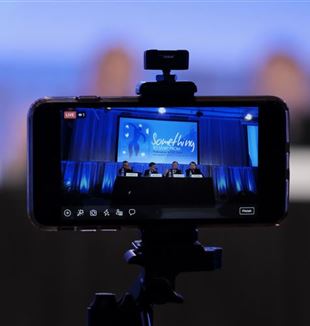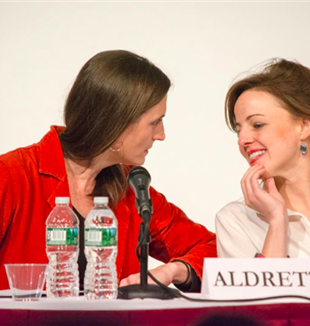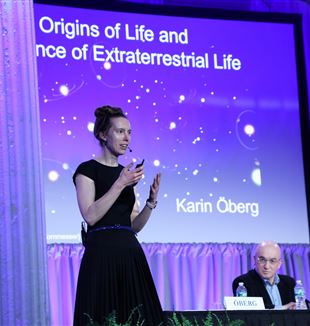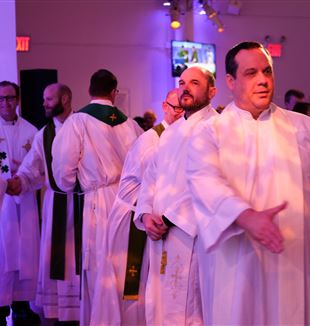
New York Encounter: That "Something" Which Conquers Life
Understanding how to begin again in our daily chaos through interventions by the Papal Nuncio, Julián Carrón, David Brooks and poet Paul Mariani among many others. The New York Encounter gave us three days to rediscover what the heart is and Who makes it.“An explosion of life” were the words used by Paul Mariani, who had only arrived an hour before. A seventy-eight-year-old New Yorker and true poet, he knows the weight that words have, and those words swelled up from his heart all of a sudden, after looking around for some time: “This place is an explosion of life!” It was populated by different people who, just by looking at them, one could see were very happy to be there: millennials and retired folks, high schoolers and famous scientists, families with children and religious sisters, all within the continuous hubbub of life happening on the three floors of the Metropolitan Pavilion in Manhattan where the 2019 New York Encounter vibrated.
The date changed in respect to last year (moved down by a month), the program was filled up (23 events in a little over 48 hours, plus the exhibits, the shows, the poetry prize), and the number of volunteers increased (350, in their red and blue t-shirts). But the spirit remained the same: a weekend full of life; true life full of questions and expectations, thirsty for a response. This could already be seen from the title: “Something to Start From.” Does this something still exist within the chaos in which we are entangled? Is it still licit to await the fulfillment of our desire for happiness? Then how? And where? What can make it possible?
The possible answer lies in one red dot which stood out in the chest of Matisse’s Icarus, the image for this year’s Encounter. It is the heart, in the words of the Bible, and Fr. Giussani helped us rediscover it: the desire for totality that we cannot remove from ourselves, an intact capacity to make judgements, even hidden beneath the ashes of a society that seems designed to lull the heart to sleep. “And instead, hearts on fire and men who are truly alive, still exist. Do they ever!” said Riro Maniscalco, president of the event organized by the American Communion and Liberation community. “You must meet them in order to learn.” And so, we set off from there, from that heart that, at times, feels “like a motherless child,” in the words of a famous spiritual sung at the beginning of these three days. It was the beginning of a simple and touching meeting. The Encounter opened with three testimonies: a documentary on Apac, the Brazilian prisons without guards, a video testimony by Fr. Ibrahim Alsabagh from Aleppo, and a story told live of the journey made by Miriam, a former college student, and by her friends as they took seriously the invitation to “think for themselves” made by some professors in an open letter (“a provocation to understand who I am”). In the midst of the testimonies we heard a piece of solo cello, and to conclude, Maniscalco introduced what was to come: “What moves people like this? Where does this desire, this expectation, come from? This is the something that we want to get to know in these upcoming days. Let’s keep our eyes, heart, and mind open.” The first evening closed with the notes of a tribute to John Coltrane, icon of jazz.
The next day was a flurry of meetings, twelve in total, plus the exhibits. One was on the music of Bob Dylan, whose two verses from “Ballad of a Thin Man” are enough to tell all of the Mystery that we are: “Something is happening here, / but you don’t know what it is.” Another was on the “cure of the human persons” of doctors such as Giancarlo Rastrelli, Takashi Nagai, and Cicely Saunders. And there was yet another, strange and beautiful: it was called "Lost in the Cosmos", taking its name from the title of a book by Walker Percy. It consisted in the development a series of questions, discoveries and observations geared towards the search for “a true relationship between the self and reality,” one that might help to exit the image that we have of ourselves and of life - as if the person was reducible to his success, or to his civic virtue, or to his virtual existence or to any other model to which we adapt ourselves - and to rediscover the most profound and real dimensions of ourselves. To this end, explanation does little, seeing it is what throws you open. And this is exactly what happened on the second evening to the worker who was cleaning the Pavilion, as he stopped to read the panels: “But this is me. And this too, wow ... And this is also me! But who are you all?”
There was another exhibit, this one on Fr. Giussani. It took up the same portion of the Pavilion, with the same intense photos in exhibit, and the same title proposed last year: “From My Life to Yours.” The authors this time, however, were the GS kids, the high schoolers. They were a group of young people of fifteen or sixteen years old who were able to explain why “the greatest evidence that Christ exists is my heart that burns,” as Maddie from Minnesota wrote in a panel. “The proof that there is something outside of me is that my desire and my need for everything are so strong.” And it was fascinating to hear how an Italian priest born almost a century ago accompanies them now in the discovery of their desire.
On the stage, in the meantime, the crowd witnessed a parade of questions and experiences. They were not the usual “talks;” they were testimonies. And each of them merited that description in its own way. Kerry Cronin and Emily Esfahani, a teacher and the other a writer, discussed the “epidemic of solitude” by which we are assaulted. But there was also talk of art, of non profits, and of space research. Another corner of the Encounter hosted dialogues about work, in the “short talks” of a small space blocked off for that purpose.
Then there was the principal meeting. The title was taken from Gaudete et exsultate, Pope Francis' Apostolic Exhortation that invites to sanctity: “Do not be afraid to set your sights higher” because it is only in this way that one may “discover in the depths of the heart the response to his desire for happiness and meaning,” as the message of the Pope to the New York Encounter, sent through Cardinal Parolin, read. Discussing this title were Archbishop Christophe Pierre, Apostolic Nuncio in the United States and long time friend of the Encounter, together with Austen Ivereigh, English journalist and biographer of Francis, and Fr. Julián Carrón, the head of CL. It was an extremely rich meeting, which deserves an article of its own.
Fr. José Medina, leader of the Movement in the United States, introduced the talk in the following way: “We want to get to know Francis better by asking those who know him well.” It began with Ivereigh, who made a note of how the “surprising humanity of the Pope does not depend on his temperament, but on the fact that he makes room for the Spirit.” Pierre remembered the impression that the document of Aparecida left on him, which was a text written by the bishops of South American to which Bergoglio, then archbishop of Buenos Aires, gave a decisive contribution: “When I read it, I said: finally, something new. You could see the desire to respond to the real needs of people today, there where they live. You could feel the beginning of a new period.” In the Pope, obviously, he saw the same impulse: “We need to help people to encounter Christ. If you do not encounter Christ, then the Church does not exists. And if the Church does not respond to the desire of persons, then it is useless.”
Ivereigh emphasized that the problem is exactly that: "Why doesn’t the Gospel arrive to people anymore? The point is the transmission of the faith. The old mechanisms do not work any longer." What is the Spirit asking us in this circumstance? Maybe we need to change in order to encounter man. “Change” was a recurring word, as was “going out,” another key word of the Pontificate. Pierre pointed out that “the Church is not a business. It is the Mystery of the presence of God in history. If we stay between four walls, protected, what can we pretend to give to people? They will not listen.”
Carrón too underlined that the Church “has a problem with modernity.” And he summed it up in the following way: “The most important value of the modern world is freedom. Can we offer something to man’s freedom?” If it is true that, as Péguy says, we are the “first generation without Christ, after Christ,” then the only possibility of responding to this situation is to “cut to the chase: simply, to live Christianity. It is the announcement of the Christian event just like it was announced for the first time,” said Carrón. And it is a great occasion: “The epoch that we are living now gives us the possibility to understand what Christianity is.” It is a challenge that touches all Christians, not only the Church: “In every occasion in which we meet others - work, vacation, study - can we offer them a way of staying in reality, of living, that embraces them? We do not need to worry about the reform of the Church, but with the conversion of ourselves.”
Pierre stressed that “faith is based on an encounter” and, for this reason, it is necessary to be “missionary disciples.” Ivereigh approved and reminded everyone that the repetition of this has been a constant point of the last few Popes. Medina asked the speakers to delve into the relationship between freedom and authority. And Carrón responded: “We are at the times of the Empire: We live in a multicultural society in which each person does whatever he wants. But do we have something crucial for responding to the desire for fulfillment that is it man? This is the challenge.” A similar thought ran through the conclusion: “For us, this is an extraordinary moment: we are called to go out to verify if the original nature of the faith can be interesting for everyone.” There is just one condition: “That Christianity be Christianity. That it not be reduced to sentiment, ethics, rules, but that a fascination remain. It has been since John and Andrew that it is communicated in this way.” This means that our task is clear: “Offer to all that which we have received by grace, because we did not receive it only for ourselves, but for all.”
After just a couple of hours there was another huge meeting: “An Irreducible Expectation.” It was the return to the New York Encounter of David Brooks, columnist at The New York Times. He spoke with Fr. Javier Prades, rector of San Damaso in Madrid. But even here, this was not the classic “talk.” Brooks surprised everyone by speaking of himself. He spoke of a context marked by “the loss of desire” and, at the same time, of an irreducible point that resists within man. He spoke of questions of which he became aware in the years (“we seek a sense, a direction: but on this point so urgent we find ourselves with nothing to say”) and of a path that, through many fears, has made him discover how skills and success are not enough, nor is that fight for an independence that risks becoming a condemnation (“in the end, the person without ties is the person whom no one will remember”). He told of “a heart that seeks Another and of a soul that seeks the good.” He also spoke of the importance of re-finding relationships in order to be oneself: “The response to individualism is a social community.” Just like the one in which he has found himself involved, which is a project for the formation of young people in the inner city. Just like Cometa, the house of families in Como that he visited some months ago. And just like CL, that he explicitly cites.
Prades delineated a broad scenario, speaking of a context marked by uncertainty, by the lack of coordinates for understanding a world that has become incomprehensible. He then spoke of the necessity to find “spaces of action” and of a path for rediscovering one’s own humanity “that does not pass through theories, but through experience. For a baby it is not enough to know that mothers love their children: a baby wants to be loved by his mother.” For this it is decisive to realize “the epistemological value of an encounter: something must happen in our lives, so that it can put in motion our self.” He recounted a personal episode: his first trip to New York, at fourteen years old, getting in from Spain which was another world. “I remember well the wonder I felt in front of a kind of greatness I had never seen. But you realize that in some way life calls you to decide: if that greatness is enough or if you must go even deeper in order to respond to all of your desire. I’ve had an encounter that contains something even greater than New York, that embraces the entire world and the sense of all that exists.”
At dinner with Brooks and his wife, Anne, there were non-stop questions: on the Encounter, on the work that goes into it, on the title ... But it was striking above all to hear him talk about himself without any masks because “the path I am walking is asking me to be loyal,” and because here there is a context that allows him to speak like this. These are more or less the same words that Steven, the husband of one of the guests, would say a day later when, at dinner, he recounted some of the decisive facts of his life before his wife who watched him, amazed. “Normally, I speak little, but here I have found ears that know how to listen.” It was said also by Esfahani, the writer: she was supposed to leave right after her meeting, but she ended up staying for a long time. At a certain point, she was moved: “You don’t know how much of a gift it is to be here with you.” This here is “a place where those who came were able to open their hearts,” said Angelo Sala, who is among the organizers of the Encounter. “People thirst for this.” And it is not only a question of the crowd, of full conference rooms and tight spaces: it is an environment “in which whoever comes, from the volunteer to the speak, ends up giving the best of himself.”
On Sunday morning, there was Mass in memory of Fr. Giussani, close to the anniversary of his death. Archbishop Pierre celebrated, and the Gospel was that of the Beatitudes. These words of Christ, as explained by the Nuncio, are a calling “to live in a different way.” They are also a call to make the choice that the same Giussani pointed to, a simple but decisive decision: “Man depends, always,” Pierre reminds everyone. “He must decide whether to depend on He who makes everything, or on power.” At the end, Fr. Medina thanked him on behalf of everyone for his friendship and for “how he pushes us to become evermore children of Giussani.”
The name of Giussani returned later, during the meeting on the education of the heart. The protagonists were the same Pierre, together with Jon Balsbaugh, president of Trinity Schools Network, and Stanley Hauerwas, famous theologian, one of the first, in these parts, to get to know the works of the founder of CL. He appeared in a video, interviewed by Holly Peterson. He spoke of education as a help for discovering reality within a relationship (“no one needs to be formed, but loved”) and recognized in Giussani a great “capacity to speak to young people, and to everyone, in a way that calls them to be themselves,” because “only an education of the heart creates an autonomous and free self, which is a different thing from being independent," as Balsbaugh observed.
Pierre instead spoke of his nephew, who had to research Descartes and found himself drowning in sites from Google. “There is a sea of difficult answers to face, if we do not have the right questions.” The heart as Giussani spoke of it is decisive for this: “The teacher is the one who helps you enter into relationship with the reality that you have around you.”
There was still time, in the afternoon, to see Robert George, celebrated jurist from Princeton, sing and play with his friends, after having spoken of Bob Dylan. Or for hearing Francis Greene, art historian, who spoke of Andy Warhol. And, even more, to listen to other testimonies that touched everyone: Sr. Laura Girotto, who came from Ethiopia and talked about of her mission in Africa, as well as Dawn Ford, teacher at during the Sandy Hook massacre, and Jenny Hubbard, mother of one of the victims, who described what it meant to “live a new beginning” after the massacre: “When you arrive to the bottom of your own strengths, you realize you have nothing,” Hubbard said. “And it is there that you understand that it is God who does everything.”
We heard similar words in the last meeting. It was dedicated to Chiara Corbella, the young mother for whom now there is an open cause for beatification. It is a famous story: Chiara died of cancer in 2012, at twenty-eight years old, after having refused care that would have harmed Francesco, the baby she had in her womb. Two other babies of hers had died shortly after birth. But there was a strange joy that you could sense in the stories told by the speakers on the stage and in the same face of Chiara, who appeared in a video witness she gave at Medjugorje two months before dying. Angelo Carfi, the doctor who became her friend during her sickness, talked about how he was struck by what he saw at the funeral of her second child: “I said to myself: faith here is not an anesthesia. They are not crazy; they are suffering. But, then, from where does this joy arrive?” And Enrico Petrillo, the husband of Chiara, explained where the strength came from that allowed his wife to ask with a smile on her lips for “the grace to accept Grace,” to say yes to the will of God: “The center of her life was Another. Chiara was a daughter, she lived like a daughter everything that the Father had put into her life. She had this capacity to make space for Grace, to let herself be loved. But we too are called to the same thing: to live this sonship.” And in this lies that something from which to restart, always: the heart, which seeks He who made it.
The meeting ended, and there was the announcement of the final celebration. But in the back of the room, something striking was heard. It was Paul Mariani, the poet, who, moved, embraced one of the organizers: “Whatever I can do to help, let me know. Coming here has changed my life.”


